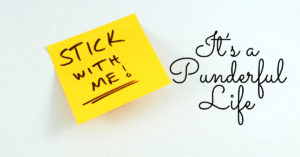The following article may include links to various products/services. Using these links may result in my earning a small commission that helps me keep this site going! Thank you for your support!
Puns have a pretty rocky reputation, and not for any good reason as far as I can see. Studies have shown that punnery skills can be a sign of anything from brain damage to high intelligence, inclusive of everything in between.
Simply defined, a pun is a play on words. It’s a joke that exploits other possible meanings of a word. They’re often referred to as ’dad jokes’ or ’groaners,’ but they deserve to be revered more highly than that.
The history of the pun
John Pollack, author of The Pun Also Rises, explains in his interview with NPR that this form of wordplay dates back at least to 7th century B.C.
Since then, puns have been present in all forms of great literature— most notable Shakespeare’s works— as well as in political contexts, academic research, and yes, even around the dinner table when a child brings home a date to meet the parents.
Perhaps it’s worth asking whether the pun’s stereotype as a ’dad joke’ came about simply because there are so many more ’dads’ than there are academic studies on the subject, or written works rife with puns? There is power in numbers, and the numbers could lend to that stereotype.
Puns as a sign of higher intellect
I’ve heard puns described as ’the lowest, cheapest form of humour.’ Needless to say, owing to my self-appointed title of Goddess Queen of Puns, I strongly disagree with such a statement.
There is a legitimate level of skill required not just to craft a pun, but to understand one. Your brain is practically doing gymnastics trying to figure out why a given word of phrase is funny in the context it’s used, or how one can explain the double-entendre hidden in a statement.
Puns can be a sign of high intellect for these reasons. The wit behind many of them speaks for itself. Heck, oftentimes we make puns completely by accident by misusing words.
On the other hand, it has been proven that this skillset can also be a sign of brain damage.
Puns as a sign of brain damage or neurological disorder
In 2016, a study found that frontal lobe damage can result in pathological joking, or Witzelsucht. These instances can result in a person’s proclivity to share ‘bad’ or ’cheap’ puns on a compulsive basis, and/or at odd hours. It can also lead to a person’s inability to process ’non-simple’ humour.
It’s worth noting that these behaviours can be out of the person’s control, so I believe it’s important to talk about the complexity of wordplay. Whether an individual’s habit is borne of high skill, or of cognitive impairment, we’re likely to never know— so why criticize? Laughter is the best medicine, after all. A chuckle can go a long way.
How does the brain process puns?
It’s been suggested in the academic world that both sides of our brains are required to fully appreciate a joke. The left side (the linguistic hemisphere) is where the actual words are processed, while the right side processes the double-entendre or hidden meaning.
Groaning as an immediate reaction to wordplay is quite common, and I believe it to be just as good as a laugh (if not even better).
Why do people dislike puns?
Apart from stereotypical reasoning, many people find puns to be a literal distraction from the topic at hand. Those who need an extra second to process the hidden meaning sometimes feel foolish for needing that time, and opt to express their displeasure by interpreting the joke as a distraction from their train of thought.
If your personality is one that is driven by rules, and regulations, you may be predisposed to dislike puns. They step away from the norm, and many find that threatening.
On a personal level, I’ve heard so many people tell me that they ‘couldn’t keep up with me’ as far as puns go, or that they ’don’t know how I do it.’ Perhaps, then, it’s fair to say some distaste for wordplay comes from a place of envy? (Subconsciously, even?)
Final thoughts
The English language is basically a Heinz 57, created with a mishmash of other languages, borrowed and adapted idioms, and frankly interspersed with the most random concepts. Who the heck decided on the ’I before E except after C’ rule, anyway?
Puns have a rich history, and are difficult to explain even with many scientific studies dedicated to them. That knowledge alone should suffice to say they’re not simply ’the cheapest sort of humour,’ or ’wasted time.’
Go ahead and groan— in fact, please do! A groan reaction says to me that the person sees through the pun and secretly thinks it’s hilarious.
